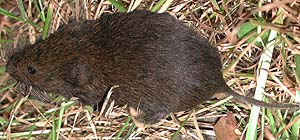RENEGADE GARDENER™
The lone voice of horticultural reason
Life and, Well, Death
9-23-02 — Earlier this summer a homeowner asked me what he should do about voles in his yard. Voles (also called meadow mice or field mice, genus Microtus) are small, compact rodents with grayish brown fur, stocky bodies, small eyes, short legs, and a propensity for feasting on the roots, shoots, and trunks of just about everything we try to grow in a yard and garden. My pat answer– kill them, by pouring the poison zinc phosphide in pellet form down as many of their holes as one can find (provided there are no pets using the area) – was met with a horrified gasp. Couldn’t do that, he explained, walking away.
 Fair enough, I thought, then you’ll just have to put up with voles, for if you’re hoping to catch them in a live trap, you’ll need to invent one first. Now, months later, the conversation has popped back into my consciousness, no doubt because the subject at hand – death – cannot be dismissed so flippantly.
Fair enough, I thought, then you’ll just have to put up with voles, for if you’re hoping to catch them in a live trap, you’ll need to invent one first. Now, months later, the conversation has popped back into my consciousness, no doubt because the subject at hand – death – cannot be dismissed so flippantly.
Had he asked me about controlling deer, or rabbits, I wouldn’t have suggested poisoning them. Oh, I once wrote an article for this site on battling rabbits in the garden that included a good hasenpfeffer recipe, but that was a joke. Still, why this cavalier attitude about killing voles? Because they’re small? Because they die underground, pre-buried, no smell, no muss, no fuss?
How does one decide what to kill and not kill, in the name of gardening? I would never shoot or poison a deer; anyway, there are laws against it, and for good reason. But what is that good reason? Because a deer can look you in the eye? Because the carcass is ungainly? Because deer are of a higher order than voles? Says who?
 Gardeners are forever at the center of this issue. We create landscapes to please our senses, yet cannot do so without creating food for wildlife. Deer (and rabbits, birds, squirrels) eat what is available to them in nature, and in areas where man has flourished, this includes our gardens. Voles love man-made landscapes also, for they find it easy to tunnel in loose, cultivated soil, where they feast on the bulbs and roots we provide them. In a sense we invite animals to the party, then shoo them away – or kill them – when they misbehave.
Gardeners are forever at the center of this issue. We create landscapes to please our senses, yet cannot do so without creating food for wildlife. Deer (and rabbits, birds, squirrels) eat what is available to them in nature, and in areas where man has flourished, this includes our gardens. Voles love man-made landscapes also, for they find it easy to tunnel in loose, cultivated soil, where they feast on the bulbs and roots we provide them. In a sense we invite animals to the party, then shoo them away – or kill them – when they misbehave.
The solution to this quandary lies not in gardening books. How we control the impact wildlife has on our gardens is most often left to personal judgment. I suspect the man who balked at poisoning voles developed his stance based on upbringing, experience, and reasoning that dates back to his childhood, whereas I lean a little nearer to the “man has been granted dominion over the fishes of the sea” school of thought. Perhaps there is no right or wrong, so long as our paths are contemplated, and our decisions resolute.
Don Engebretson
The Renegade Gardener